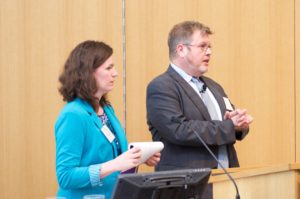The UNC Charlotte Gerontology Program celebrated its 25th anniversary this spring, while helping state leaders roll out North Carolina’s first plan to comprehensively address dementia.
The community conversation drew students, scholars, practitioners and community activists from the gerontology field to UNC Charlotte Center City.
“Discussions like those at the 25th anniversary celebration are a small part of our efforts to collaborate with community partners to identify ways to implement the recommendations of the Dementia Capable North Carolina plan,” said Gerontology Program Director Julian Montoro-Rodriguez.
This is especially important for Mecklenburg County, whose Alzheimer’s mortality rate is consistently among the highest in the state, Montoro-Rodriguez said.
 Mark Hensley, an Alzheimer’s specialist at the NC Division of Aging and Adult Services and Berkeley Yorkery, associate director of the NC Institute of Medicine, presented details of North Carolina’s first statewide Alzheimer’s plan. They highlighted the aspects of the plan toward creating a dementia-capable state, or one that is informed, safe and respectful of individuals with dementia and their families, provides supportive options and fosters quality of life.
Mark Hensley, an Alzheimer’s specialist at the NC Division of Aging and Adult Services and Berkeley Yorkery, associate director of the NC Institute of Medicine, presented details of North Carolina’s first statewide Alzheimer’s plan. They highlighted the aspects of the plan toward creating a dementia-capable state, or one that is informed, safe and respectful of individuals with dementia and their families, provides supportive options and fosters quality of life.
North Carolina has the nation’s 9th fastest growing older adult population with an estimated 160,000 persons currently with Alzheimer’s or a related dementia. That number is estimated to increase to over 300,000 by the year 2030.
The Gerontology interdisciplinary program is a program shared by the College of Liberal Arts & Sciences and the College of Health and Human Services, with faculty drawn from throughout the university. The program originally offered a gerontology minor, and later expanded course offerings to include the current master’s degree and graduate certificate program. This fall, the program will also offer a hybrid online graduate certificate with in-person classes held at UNC Asheville.
“During the past years the Gerontology Program has been educating and training students and professionals on how to work with older adults, promote a positive experience of aging, and improve the quality of life for older adults in Charlotte and North Carolina,” Montoro-Rodriguez said. “Our priorities are to continue working with community partners across sectors to assess the needs of older adults, identify priorities for caregivers and implement evidence-based programs to support them.”
Words: Wills Citty | Images: Lynn Roberson








